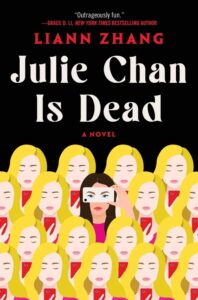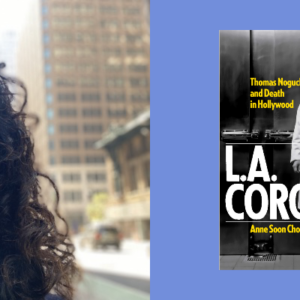I’ve heard the phrase thrown around: “Influencers are the new celebrity.” It’s hard to avoid these personalities during our digitally inclined era. And just like the classic celebrity, who has captured the fascination of readers across all genres—in particular, thrillers—influencers have wormed their way into the book space as well.
I’m sure I’m not the only reader who has noticed the significant uptick of influencer-crime stories. From the aptly titled The Influencers by Anna-Marie McLemore, to You Will Never Be Me by the cozy mystery titan Jesse Q. Sutanto, influencers have become the focus of authors and readers alike. Of course, I am no exception, having written a whole thriller about influencers myself, Julie Chan is Dead. But this does bring about the question, what makes the world of influencers so conducive to the crime and thriller medium?
When I was a teenager, I stepped into the shoes of an influencer briefly when I opened a skincare focused review account on Instagram. While I never grew to the millions and millions that ultra-famous influencers have these days, I did have the privilege of getting a peek behind the scenes, learning the everyday minutiae of being an influencer, and bathing in a temporary glamour. All the while, I got to see the guts of this industry with my own eyes.
Imagine it: With one picture, a few sentences, you could earn as much as you did working for a whole week—and that’s on a low end! That is the life of an influencer. To no one’s surprise, with this significant financial incentive, creators may be inclined toward a certain curation of truth. Unfortunately, being the young and fallible teen I was, I fell straight into the shiny golden trap.
I’m not proud to admit, but I had regularly brown-nosed brands by hyping up certain products as revolutionary or incredibly hydrating, when it was just okay in exchange for sponsorships or simply free products. And it wasn’t just me. I know dozens of other influencers who have done the same. Hell, sometimes these brands actively put words into our mouths with their copy, which we’d happily paste into the caption, because how could we say no to the money waved in front of us? Of course, the opposite worked as well. I remember one time when I posted a mediocre review on a product sent to me for free, which promptly brought about a snippy reply from the beloved, major brand which was then liked by the CEO herself. I was quickly taken off the PR list, though the review wasn’t even particularly negative–I was more concerned about the lack of discretion in ingredients. However, to no one’s surprise, this behavior from brands created an ecosystem where many influencers– especially smaller ones, like me– became afraid to post honest content.
Indeed, as much as I loved the attention and the monetary reward, I soon began to lose myself. Sucked into this trap of social media, I became a piece of meat chewed out for content. Luckily, I was able to jump the ship by setting my sights on a new passion: writing.
I had this feeling that my time as an influencer and my perspective could be the seeds to an amazing book. I just had to figure out a vehicle to deliver my thoughts in a compelling manner. As such, I began to break down how I felt about the influencing space, and how we, as an audience, perceive influencers, to find the key to a story.
For the most part, I’d like to think that most consumers are able to recognize the fact that authenticity is not promised when we engage with influencers. We can see how their personalities and content are curated for consumption, not the facts. If a small, inconsequential influencer like me distorted the truth for gain, what do those with real social capital lie about? And why do they lie? As well, we are shown a very small snippet of an influencer’s life, while the rest remains a mystery.
And there it was.
The mystery of their lives behind the camera. The lies in their posts. Just like the traditional celebrity, who we only see on screen as their shiny, glamorous selves, the influencer lives a second life offline that is unknown to most. But what sets the influencer apart from the traditional celebrity: their fame is based on a certain level of relatability, and the perception of closeness with their followers. Most influencers purposefully build a community with a guise of honesty and proximity where the follower becomes less of a fan, more of a family member. After all, only with that kindred, personable connection would someone trust you enough to blindly buy a product from their words.
This deceit naturally gives rise to the tension that is so necessary in thrillers and suspense. There’s always a constant questioning of the truth. How much can you really trust the people you watch? What really goes on behind the scenes?
In my opinion, this grey area off camera is what makes the influencer so appealing for modern writers. Not only is the topic of influencers quintessential in everyday life, this parasitic relationship between the consumer and the influencer, and the questioning of who they really are behind the camera paves the pathway to a compelling thriller and mystery. Since anything—really, anything at all—can exist behind the camera. Whether it be murder, or stolen identity, or conning, or cults, the breadth of possibility is endless.
And perhaps, as a reader, there’s also a certain sprinkle of schadenfreude mixed in. Raise your hand if you’ve been envious of an influencer or what they have. If you’ve ever frowned at their antics, their excess, their loudness, their complete disregard for public decency, general tone deafness, or their literal acts of crime. (We’ve all seen the articles.) My hand is certainly up. And I would guess your hand is raised too. So, it’s not surprising that so many authors have been throwing influencers into the mix in their thrillers where murderers and mysteries are abundant. Maybe, a certain part of us wants to see those enviable characters suffer, just a little. To see their pompous personalities put in place through fiction.
***


















